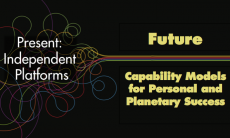The four speakers ranged in age from 17 to 23, and each was already running a company. The 23-year-old was on her second startup, having raised $1 million for her first venture from investors (including Richard Branson) when she was just 18 years old.
The youngest speaker, 17-year-old Zach Latta, tested out of high school and moved to San Francisco with his parent’s permission to make his fortune. An app he developed called Yo briefly became a viral phenomenon in 2014. His current startup is helping to imbue secondary school students with a love of coding.
Thomas Sohmers leads REX Computing, a startup that’s developing low-power, high-speed computer processors. REX recently raised $1.25 million and has a sizable contract with DARPA. Thomas is 20.
The four panelists came from a wide variety of regions and backgrounds, and each is charting a different career path. They all have three things in common: a passion for technology, a conviction that each can individually change the world, and a nearly complete lack of interest in formal education.
Cisco Systems Inc. brought them together at a CIO conference earlier this month to offer insights into the impact that the Internet, cloud computing, and social media have had on the next generation of American workers. The speakers shattered many of the commonly held stereotypes about millennials.
These remarkable young people are members of the Thiel Fellowship, an organization started by PayPal co-founder Peter Thiel that awards gifted young entrepreneurs with grants of $100,000 and the expectation that they will drop out of school to pursue their dreams. The Fellowship’s dismissal of traditional academia has been controversial, but no one would argue about the potential of each of the Fellows who represented it that day.
It’s not that these young people don’t value education, it’s just that they don’t think a school classroom is the best place to get one. There’s no reason to bother with tuition and term papers when much of Harvard’s and MIT’s coursework is now available free online, Latta said. “It’s incredible how much power someone who decides not to go the traditional route has today,” he commented.
Added Sohmers, “The education system doesn’t encourage really figuring out why something works. It’s just rote memorization. It’s really for the industrial age.”
Millennials are sometimes stereotyped as feckless layabouts because so many of them are choosing to live at home after college instead of venturing out on their own. Housing costs and wage rates have a lot to do with that trend, but so does the changing nature of the workplace. Between freelancing and virtual teams, it’s less important than ever for people to seek housing close to an office.
“We don’t have set work hours. We have an entrepreneurial culture that gives people responsibility to create something they’ve built and own,” said Stacey Ferreira, who started a YouTube-focused ad agency after selling her Branson-funded venture in 2013. “My peers say that once they’ve learned everything they can learn at a company, it’s time to leave.”
The Freelancers Union said it has seen a 3,000% surge in members under 35 over the last eight years. A survey conducted last year by the union and the freelancers’ exchange site Upworld found that 79% of millennials would consider quitting their regular job to work for themselves and 38% are already freelancing, the highest percentage of any age group.
For a generation that has grown up with information at its fingertips, traditional routes to success are too slow. The career paths that the CIOs who attended the session that day room had taken – working up through the hierarchy and earning promotions through patience and tenacity – made no sense to them.
They are the children of the cloud. They’ve grown up in a world of seamless global communication that can make anyone a YouTube star, a celebrity blogger, or the developer of a hit mobile app used by millions. Their expectations are completely different from those of the generations that came before them.
When he was writing code for Yo, “My motivation was whatever I did was going to be used by a million people tomorrow,” Latta said. Cloud, mobile, and social have made such impact possible.
That doesn’t mean this generation can’t be team players, but it’s clear that fulfillment is more to them than a paycheck. Their role models are Branson, along with Twitter’s Evan Williams, Michael Dell, Bill Gates, Oracle’s Larry Ellison, and Steve Jobs, all of whom have one thing in common: they never graduated college.
It was perhaps not lost on many of the CIOs in the room that the four brilliant young people on stage before them wouldn’t make it past the first level of HR screening at their companies because they lacked a college degree. Something needs to change there, and don’t count on the millennials to be the ones changing.
Creative Commons photo by Greg Westfall via Flickr.







